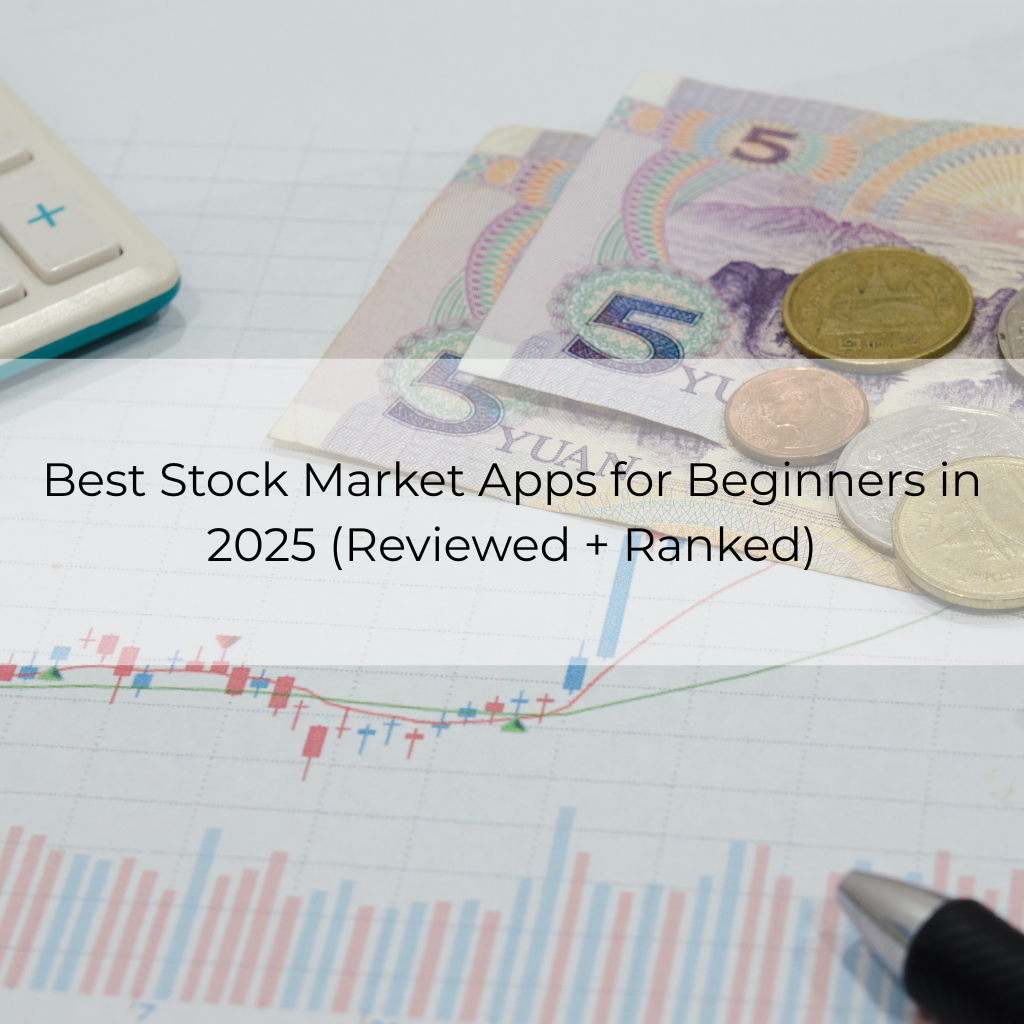Best Stock Market Apps for Beginners in 2025 (Reviewed + Ranked)

Retail investing has never been more accessible than it is in 2025. With just a smartphone and a few taps, anyone can start investing in the stock market — no background in finance required. This surge in accessibility has opened the doors for millions of first-time investors to take control of their financial futures, right from their mobile devices.
But with so many apps claiming to be the “best for beginners,” how do you choose the one that actually fits your goals, experience level, and comfort with risk?
This guide is designed specifically to address that issue.
Unlike generic roundups that simply list apps based on downloads or star ratings, we’ve gone deeper. In this guide, you’ll discover:
- The real features that make a stock app beginner-friendly
- Detailed reviews of the top apps in 2025 — including pros, cons, and user insights
- Critical factors most websites skip: security, customer support, and global availability
- A smart comparison table to help you decide faster
Whether you want to start small with $10 or build a serious investment habit, the right app can make the difference between confident growth and confusing setbacks.
Let’s break it down.
How to Build a Diversified Investment Portfolio (2025)
What Makes a Great Stock Market App for Beginners?
Not all investing apps are built with beginners in mind. While some are loaded with advanced charts and trading tools, others focus on simplicity, education, and helping you grow with confidence.
Here are the key features that make a stock market app truly beginner-friendly in 2025
1. Easy-to-Use Interface
When you’re just starting out, navigating a cluttered app filled with jargon and flashing charts can feel overwhelming. The best beginner apps have clean designs, intuitive dashboards, and simple explanations of complex terms. You should be able to check your portfolio, make a trade, or learn something new — all without feeling lost.
2. Low or No Trading Fees
High fees can eat into your returns before your portfolio even has a chance to grow. Many top apps now offer commission-free trades, which means you can buy and sell stocks or ETFs without paying per trade. For beginners with smaller portfolios, this feature is essential.
3. Built-in Learning & Educational Tools
The best apps don’t just let you trade — they help you understand what you’re doing. Look for platforms that offer:
- In-app tutorials and videos
- Beginner investing guides
- Explanations of key terms (like ETFs, dividends, volatility)
These features can shorten your learning curve and help you make smarter decisions.
4. Fractional Shares Support
Want to buy into big-name stocks like Amazon or Tesla without spending hundreds of dollars on a single share? Fractional investing lets you buy a portion of a share with as little as $1. This makes it much easier for beginners to start building a diversified portfolio, even with a limited budget.
5. Reputation and Reliability
An app might look great on the surface — but if it goes down during market hours or has poor customer service, you’re in trouble. Stick with apps that are backed by reputable financial institutions, are well-reviewed by users, and have a track record of performance and security.
With these five features as your baseline, you’re far more likely to choose an app that supports your growth as an investor — not one that just pushes you to trade.
Top 7 Best Stock Market Apps for Beginners in 2025
Choosing the right stock market app can make your first steps into investing feel exciting — not intimidating. Below are seven of the best beginner-friendly apps in 2025, reviewed for their usability, cost, features, and how well they support new investors.
1. Robinhood
Overview
Robinhood revolutionized commission-free trading and remains one of the most popular apps among first-time investors.
Key Features
- Commission-free trading for stocks, ETFs, and options
- Easy-to-navigate interface
- Fractional shares
- Cash card & recurring investments
Pros
- One of the simplest apps for total beginners
- No minimum deposit
- Real-time market data
Cons
- Limited educational content
- No retirement account support
Pricing/Fees
- $0 commission trades
- Robinhood Gold (premium): $5/month
Best For
New investors who want a clean interface and quick access to stocks and crypto.
Security Snapshot
- 2FA enabled
- SIPC insured up to $500,000
- Biometric login supported
Customer Support
- Live chat and phone support (improved in 2025)
- Help center lacks depth for more technical questions
2. SoFi Invest
Overview
SoFi Invest is part of SoFi’s larger personal finance platform, offering beginner-friendly investing alongside banking and loans.
Key Features
- Commission-free stock and ETF trades
- Automated investing (robo-advisor) available
- Crypto trading
- Free access to financial planners
Pros
- Great for hands-off beginners
- Strong educational content
- Fractional shares + no account minimum
Cons
- Limited stock research tools
- Smaller selection of investment options
Pricing/Fees
- $0 for self-directed investing
- No advisory fee for automated portfolios
Best For
Beginners who want investing plus full financial planning under one roof.
Security Snapshot
- 256-bit encryption
- SIPC protection
- Multi-factor authentication
Customer Support
- Highly rated mobile support
- Live chat, phone, and email available
3. Fidelity
Overview
Fidelity is a legacy financial giant with beginner-friendly tools, especially for long-term investors.
Key Features
- Commission-free trades
- $0 account minimum
- Robo-advisor available
- Strong retirement account options
Pros
- Trusted reputation and deep resources
- Strong mobile app experience
- Excellent educational library
Cons
- Interface slightly more complex than others
- Overwhelming for active traders
Pricing/Fees
- $0 trading fees
- No account fees
Best For
Novices aiming to invest for long-term objectives and retirement.
Security Snapshot
- Advanced fraud monitoring
- 2FA and voice biometrics
- SIPC coverage
Customer Support
- 24/7 phone support
- Chat, email, and in-person branches
4. Webull
Overview
Webull appeals to beginners who want room to grow into more advanced trading without being overwhelmed upfront.
Key Features
- Commission-free stock and options trading
- Advanced charting tools
- Real-time data and news
- Paper trading simulator
Pros
- Great for visual learners
- No minimum deposit
- Crypto trading available
Cons
- Not as beginner-centric as Robinhood or SoFi
- Lacks personalized advice
Pricing/Fees
- $0 trades
- Small regulatory fees on options
Best For
Beginner investors interested in active trading and analysis tools.
Security Snapshot
- Encrypted data + 2FA
- SIPC insurance up to $500,000
Customer Support
- App-based help and email
- No live phone support
5. M1 Finance
Overview
M1 combines investing with automation, making it perfect for beginners who want control without daily micromanagement.
Key Features
- Customizable portfolios (“Pies”)
- Fractional shares
- Recurring auto-investing
- Optional M1 Plus features
Pros
- Automates investing smartly
- Hybrid of robo and DIY investing
- Clean and modern interface
Cons
- No real-time trading
- No mutual funds or bonds
Pricing/Fees
- Free version available
- M1 Plus: $3/month (billed annually)
Best For
Goal-based beginners who want automation and customization.
Security Snapshot
- Bank-level encryption
- SIPC-insured brokerage accounts
Customer Support
- Email support with solid turnaround
- No live chat or weekend service
6. E*TRADE
Overview
A veteran in the online brokerage space, E*TRADE offers depth without overwhelming total beginners.
Key Features
- Wide investment options
- Excellent educational tools
- Core Portfolios (robo-advisor)
- High-quality mobile app
Pros
- Strong support for beginners and advanced users
- Great research tools
- Helpful video content
Cons
- Interface can be dense at first
- Slightly longer learning curve
Pricing/Fees
- $0 commissions on US stock trades
- $500 minimum for robo portfolios
Best For
Beginners who want to learn and grow into more serious investing.
Security Snapshot
- High-grade encryption + device monitoring
- SIPC insurance included
Customer Support
- 24/7 phone and chat support
- Branch network for in-person help
7. Charles Schwab
Overview
Charles Schwab blends old-school trust with modern tech, making it ideal for new investors who want long-term value.
Key Features
- Commission-free trades
- Schwab Stock Slices (fractional shares)
- Robo-advisor and retirement tools
- Broad investment choices
Pros
- Excellent beginner education hub
- Great customer service
- Trusted brand with long history
Cons
- Some tools feel dated compared to newer apps
- Slower app updates
Pricing/Fees
- $0 commissions
- No account minimums
Best For
Beginners seeking a stable, full-service brokerage experience.
Security Snapshot
- Secure login, 2FA, and real-time alerts
- SIPC & additional insurance coverage
Customer Support
- Highly rated 24/7 service
- Local branch access available
Comparison Table: Best Stock Market Apps for Beginners (2025)
| App | Min. Deposit | Fractional Shares | Commission | Education Tools | Support Type | Security Notes |
|---|---|---|---|---|---|---|
| Robinhood | $0 | ✅ Yes | $0 (Stocks/ETFs) | Basic tips & definitions | Live chat, phone, Help Center | SIPC insured, 2FA, biometric login |
| SoFi Invest | $0 | ✅ Yes | $0 | Strong beginner guides | Phone, chat, email | SIPC insured, 256-bit encryption, MFA |
| Fidelity | $0 | ✅ Yes | $0 | Extensive library | 24/7 phone, chat, in-person | Advanced fraud monitoring, SIPC, 2FA |
| Webull | $0 | ✅ Yes | $0 + options fees | Basic resources | App support, email | Encrypted data, SIPC insured, 2FA |
| M1 Finance | $0 | ✅ Yes | $0 (scheduled trades) | Goal-based learning | Email support | SIPC insured, bank-level encryption |
| E*TRADE | $0 (manual) / $500 (robo) | ✅ Yes | $0 | Rich learning portal | 24/7 phone, chat, in-person | High-grade encryption, SIPC, device monitoring |
| Charles Schwab | $0 | ✅ Yes (“Stock Slices”) | $0 | Beginner-focused content | 24/7 phone, branch access | SIPC + excess insurance, 2FA, secure alerts |
What Real Users Say (2025 Ratings & Reviews)
Before you choose a stock market app, it’s helpful to hear what real investors — especially beginners — are saying. We reviewed dozens of user comments from Reddit, App Stores, and other public platforms. Here’s a quick look at what users love (and what they don’t) about each app:
5. What Real Users Say (2025 Ratings & Reviews)
Before you choose a stock market app, it’s helpful to hear what real investors — especially beginners — are saying. We reviewed dozens of user comments from Reddit, App Stores, and other public platforms. Here’s a quick look at what users love (and what they don’t) about each app:
Robinhood
🟢 “It’s simple to get started and ideal for learning the fundamentals.”
🔴 “Would love better customer service when things go wrong.”
Sentiment summary: Robinhood is praised for its simplicity, but users note concerns about service reliability during busy trading hours.
SoFi Invest
🟢 “SoFi makes investing super beginner-friendly and ties in nicely with my banking.”
🔴 “Wish it offered more advanced stock research tools.”
Sentiment summary: SoFi shines with its clean interface and full-suite financial tools, though advanced traders may find it a bit limited.
Fidelity
🟢 “Trusted platform with great learning tools — I feel safe here.”
🔴 “The app could use a facelift; it feels a bit outdated.”
Sentiment summary: Fidelity is respected for its stability and education, but newer investors sometimes prefer slicker interfaces.
Webull
🟢 “Love the charts and paper trading features. Great for active learning.”
🔴 “The interface is overwhelming at times — not for everyone.”
Sentiment summary: Webull is ideal for beginners who want to grow into more advanced features, though the UI might intimidate complete newbies.
M1 Finance
🟢 “Automated investing has never been this easy. The ‘Pies’ concept is genius.”
🔴 “Transferring funds took too long. Customer service needs work.”
Sentiment summary: M1’s automation and goal-based tools are loved by hands-off investors, but support and withdrawals may be slower than expected.
E*TRADE
🟢 “A great balance between beginner help and advanced tools.”
🔴 “Although there is a small learning curve, it is worthwhile.”
Sentiment summary: E*TRADE offers scalability — beginners can grow into more features over time, though it’s not the simplest at first glance.
Charles Schwab
🟢 “Reliable, well-rounded, and excellent customer service.”
🔴 “Account setup was a hassle — not as smooth as I hoped.”
Sentiment summary: Schwab is seen as a trustworthy long-term partner with great support, though the onboarding process can be clunky.
App Security: How Safe Are These Platforms?
When it comes to investing your hard-earned money, security should never be an afterthought — especially if you’re using a mobile app. In 2025, stock market apps have become more secure than ever, but not all platforms offer the same level of protection.
Here’s what you need to know about how these apps keep your money and personal information safe — and which platforms go the extra mile.
The Power of Compound Interest: How to Make Your Money Work While You Sleep
FDIC vs. SIPC Insurance – What’s the Difference?
- FDIC (Federal Deposit Insurance Corporation) covers bank deposits up to $250,000 per depositor — but it doesn’t apply to investments like stocks or ETFs.
- SIPC (Securities Investor Protection Corporation) protects your investment account if the brokerage fails, covering up to $500,000 in securities (including a $250,000 cash limit).
📌 All apps listed in this guide are SIPC-insured, which means your money is protected in case the broker collapses — but not from investment losses.
Encryption, 2FA, and Data Protection
Most top-tier investing apps in 2025 follow strong security protocols, including:
- AES-256 encryption: Military-grade encryption to secure data transmission
- Two-Factor Authentication (2FA): Adds a second layer of protection via SMS or authentication apps
- Biometric Login: Many apps allow fingerprint or facial recognition for added safety
- Real-time alerts: Notifications for suspicious login attempts or account changes
Security Highlights by App
| App | Security Strength |
|---|---|
| Robinhood | SIPC insured, 2FA, biometric login, real-time alerts |
| SoFi Invest | 256-bit encryption, SIPC insured, multi-factor login |
| Fidelity | Advanced fraud detection, 2FA, SIPC & secure login |
| Webull | Encrypted data, 2FA, SIPC, secure login |
| M1 Finance | Bank-level encryption, SIPC insurance, device security |
| E*TRADE | Device tracking, SIPC, 2FA, behavioral monitoring |
| Charles Schwab | SIPC + excess insurance, secure alerts, voice ID |
Which Apps Are Most Secure in 2025?
While all apps listed here offer solid protection, some stand out for going the extra step:
- 🥇 Fidelity and Charles Schwab — offer the most comprehensive protection with layered security, including fraud detection and additional insurance coverage.
- 🥈 E*TRADE — strong monitoring tools for suspicious activity and excellent data privacy policies.
- 🥉 SoFi Invest and M1 Finance — user-friendly with bank-level security and solid authentication layers.
Bottom Line: Every app on our list takes security seriously, but if top-tier protection is your priority, platforms like Fidelity, Charles Schwab, and E*TRADE lead the way in 2025.
International Access & Global User Notes
While most beginner-friendly stock market apps are designed for U.S. users, investing is a global interest — and many readers outside the United States want to know if they can participate too.
Here’s what you need to know about which apps are available internationally and what alternatives are worth considering if you live abroad.
Which Stock Market Apps Are Available Outside the U.S.?
| App | International Availability |
|---|---|
| Robinhood | ❌ Not available outside the U.S. |
| SoFi Invest | ❌ U.S. only |
| Fidelity | ✅ Available in select countries via Fidelity International |
| Webull | ✅ Available in Hong Kong, Singapore, Australia (limited) |
| M1 Finance | ❌ U.S. only |
| E*TRADE | ❌ U.S. only (some institutional services abroad) |
| Charles Schwab | ✅ International accounts accepted in many countries |
📌 Note: Availability may vary based on local regulations and account type. Always confirm with the platform before registering.
Best Alternatives for Non-U.S. Investors in 2025
If you’re based outside the United States, here are some excellent investing platforms designed with international users in mind:
- eToro – Available in over 100 countries; beginner-friendly with social investing features
- Interactive Brokers – Great for both beginners and advanced investors, widely available globally
- Saxo Bank – A regulated broker in Europe, offers access to global markets
- Revolut / Trading212 – App-based investing platforms popular in the UK and Europe
- Stake – Offers access to U.S. stocks from Australia, New Zealand, UK, and more
Tips for International Investors
- Check regulations: Some countries restrict foreign investment accounts — always review local laws.
- Watch out for FX fees: If you’re funding in a different currency, check for conversion fees.
- Look for local support: Choose platforms that offer support in your language and region.
Bottom Line: While many of the top stock market apps in 2025 are U.S.-focused, international investors still have excellent options. If you’re outside the U.S., platforms like eToro, Interactive Brokers, and Charles Schwab offer trusted ways to start your investment journey.
Stock Market vs. Real Estate: Which is the Better Investment?
How to Pick the Best App for Yourself
With so many great stock market apps available, choosing the right one can feel overwhelming—especially if you’re just getting started. The truth is, there’s no one-size-fits-all answer. The best app for you depends on your investing style, support needs, and long-term goals.
Here’s how to make a confident, informed choice:
1. Are You a Passive Investor or an Aspiring Day Trader?
Passive Investor
If you prefer to invest regularly and hold for the long term without constantly checking the market, look for apps that offer automated portfolios, fractional shares, and recurring investment options.
Best picks: M1 Finance, SoFi Invest, Fidelity
Active or Aspiring Trader
If you’re interested in actively managing your portfolio, trading frequently, or using advanced tools, go for platforms with real-time data, in-depth charts, and zero-commission trading.
Best picks: Webull, Robinhood, E*TRADE
2. Do You Prefer Guidance or Full Control?
Some Guidance Preferred
Beginners often benefit from apps that offer built-in educational content, planning tools, or access to financial advisors.
Best picks: SoFi Invest, Fidelity, Charles Schwab
Independent and Hands-On
If you’re confident navigating the market on your own, look for apps that give you full control and customization over your portfolio.
Best picks: M1 Finance, Webull
3. Do You Need Integration with Banks or Tax Tools?
Some platforms, like SoFi and Fidelity, provide seamless integration with banking, retirement, and loan services. This can help you manage your entire financial life from one dashboard.
Other platforms, such as Robinhood and M1 Finance, offer useful features like cash management accounts, tax statements, or tools for tracking investment income and performance.
4. Can the App Grow With You?
Think beyond your first few trades. As your experience grows, you might want to invest in crypto, open a retirement account, or access research reports and tax optimization features.
Look for apps that support:
- Retirement accounts (like IRAs)
- Cryptocurrency trading
- Gradual learning (beginner to intermediate)
- Advanced portfolio tracking
Best long-term picks: Fidelity, Charles Schwab, E*TRADE
Pro Tip:
Try more than one app. Most of them have no minimum deposit requirements, so you can experiment with small amounts and see which one feels best for your investing style.
Final Thoughts
Getting started with investing doesn’t have to be intimidating — especially when you have the right tools at your fingertips. Stock market apps in 2025 have made it easier than ever for beginners to take control of their finances, one small step at a time.
Here’s a quick recap of the top apps and what they’re best suited for:
Best Stock Market Apps by Beginner Type
- Best for total beginners: Robinhood, SoFi Invest
Simple interfaces and zero commissions make these great starting points for those brand new to investing. - Best for long-term, passive investors: M1 Finance, Fidelity
With features like automation, retirement accounts, and monthly payments, it’s ideal for accumulating long-term wealth. - Best for active learners and future traders: Webull, E*TRADE
Ideal if you’re eager to dive deeper into charts, research, and more hands-on portfolio control. - Best all-around platform with room to grow: Charles Schwab
Combines trust, support, and advanced features that scale with your experience.
Take the First Step
You don’t need thousands of dollars or a finance degree to begin investing. In fact, most of the apps we’ve covered let you get started with just a few dollars — sometimes even less than $10.
The most important step isn’t choosing the perfect app — it’s simply starting. Explore a few platforms, learn by doing, and keep growing from there.
Your future portfolio will thank you.
How to Start Investing with $100: A Beginner’s Guide to Building Wealth from Day One
SEO Disruptor | Paid Ads Architect | Content Alchemist | I don’t just rank pages
I build profit machines. From SEO domination to ads that print revenue, I turn digital noise into real-world business growth. Let’s connect




